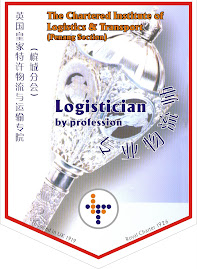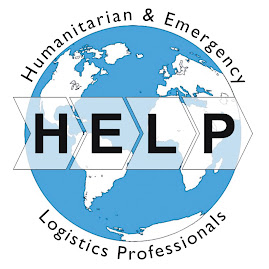
The "Logisticians", particularly the certified or chartered ones have been in great demand and have been admired by the general public, in other developed or developing countries, such as US, Australia, Singapore, China/ Hong Kong, Canada and those European countries.
In US...
The practice of logistics is a professional discipline. The SOLE's professional certification and recognition programmes recognize the professional stature and accomplishments of logisticians within commerce, industry, defense, international, federal and local government agencies, as well as in academic and private institutions. The adoption of a certification programme in October 1972 was a major step by SOLE to further the accreditation of professionals in the logistics field. This certification recognizes the functional interrelationships within the professional responsibilities of logisticians regardless of their occupational roles.
The title "Certified Professional Logistician" (CPL) is awarded to individuals of proven competence in logistics who pass an examination designed to test their broad knowledge of the entire logistics spectrum.
Effective 15 April 2004, Army officers/warrant officers in any branch/specialty that have been awarded the designation CPL by SOLE - The International Society of Logistics (SOLE) are authorized to add their CPL certification to their Officer Record Brief (ORB) and Official Military Personnel Folder (OMPF). This change to AR 600-8-104 (Military Personnel Information Management/Records) authorizes the inclusion of the CPL certificate in the OMPF.
The CPL joins, among others, the Certified Professional Engineer (CPE), the Certified Professional Accountant (CPA) and the Certified Professional Contract Manager (CPCM) as civilian-granted professional certifications authorized for documentation and recognition as specialized education and training. The CPL certification will be reflected in "Section X - Remarks" on the lower left portion of the ORB. Army National Guard (ARNG) CPLs can submit their documentation now to their State Military Personnel Officers.
The CPL programme and course syllabus was established in the United States many years ago. To qualify as a CPL candidate, individuals should have 9 years of professional experience in practicing logistics or, have a Bachelor's Degree plus 5 years experience, a Master's Degree plus 4 years experience or a Doctoral Degree plus 3 years of experience. In the United States the certification examination is ranked as the equivalent of a Masters' Degree for logistics managers and practitioners.
In Europe...
The European Logistics Association (ELA) introduced the standards, which form the foundation for the European Certification Board for Logistics (ECBL) to certify individuals who meet these Standards.
ECBL is an independent body consisting of member countries who voluntarily agree to share the Standards of Competence for Logistics and adhere to common levels of quality assurance procedures.
The European Certification Board for Logistics (ECBL) is the custodian of the Standards, and is responsible for updating the Standards as and when required.
The Board (ECBL) will be the sole authority for approving the award of a qualification, and no awards under this programme will be allowed without such approval. The Board will set up a system to monitor the performance of National Certification Centres to be established in each country, and will ensure that the Standards operating in each country are in line with the European directive. In this way, candidates for the qualifications from every country in the programme can be sure of the commonality of the Standards.
The Competence system - The ELA Standards of Logistics Competence reflect the expectations of workplace performance and the have been developed with and agreed by industry. The Standards are outcome-based and form the basis of assessment.
Assessment is independent of any learning programmes. The Swedish National Certification System in Logistics does not prescribe in any way the methods or courses by which candidates may attain or develop the knowledge and skills, however acknowledged programmes can contribute to the development of knowledge, skills and competencies required for ELA-Certification. The ability of candidates to meet the required Standards will be assessed by The Swedish National Certification Board.
ELA Certification – The European Certification for Logistics Professionals on three levels:-
EJLog – European Junior Logistician on the Supervisory/Operational Level
ESLog - European Senior Logistician on the Senior management level
EMLog - European Master Logistician on the Strategic management level
In Australia...
There are thousands of practicing and experienced logistics professionals in Australia. They range from executives, managers, senior managers of logistics or supply chain operations to probably, specialised IT experts for logistics and transportation sectors.
Professionals, like accountants have the CPA accreditation, real estate practitioners have the CPV and many other professional certifications. The Certified Professional Logistician (CPL) certification programme is now available in Australia, for all logisticians who are excellence in logistics and supply chain management, by both theorical and practicial assessments. Accreditation means something in a professional setting - it implies a focus on excellence and a commitment to personal development within the profession. Today, professionalism of a high standard is required to manage these complex, disparate functions in a seamless and integrated supply chain mode with a clear understanding of the need to track the physical goods flow, financial flow, and, of course, information flow.
The said Certified Professional Logistician (CPL) was launched by the Transport and Logistics Centre of Australia (TALC), that TALC grew out as a Commonwealth and NSW Government initiative aimed at building capability in the Transport and Logistics (T&L) industry, including road, rail, maritime, aviation and logistics. TALC, together with five industry or professional organizations ie. The Chartered Institute of Logistics and Transport in Australia (CILT-A), Supply Chain Logistics Association of Australia (SCLAA), Logistics Association of Australia (LAA), Australian Institute of Traffic Planning and Management (AITPM) and Australasian Production & Inventory Control Society (APICS), form the panel of CPL certification council, which is known as Transport & Logistics Certification Council of Australia (TLCC, Australia).
The CPL is able to demonstrate that they have the capability to effectively master the technology and leadership skills required across the broad range of activities that today constitute logistics. The CPL is a professional certification in logistics that enables practitioners in this industry to develop themselves more effectively, and assists in defining the logistics profession. This CPL also signifies your commitment to a code of professional conduct and your respected professional integrity - ensuring the highest standards of ethics and professionalism.
A profession that is dealing with a freight task that is expected to double over the next decade. The demand for professionals, technical experts and executives will continue to rise. Australia's logisticians, along with an efficient and effective land, sea and air infrastructure, will contribute to the future export success of the nation.
The CPL becomes the benchmark of excellence for measuring capability and proficiency within the profession of logistics and supply-chain management. The CPL programme represents the hallmark of logistics professionalism in Australia.
In Singapore...
The Singapore Trade Development Board (TDB), in collaboration with the Infocomm Development Authority of Singapore (IDA) and the Chartered Institute of Transport in Singapore (CILT-S) launched Asia’s first professional accreditation programme for logistics professionals. The Certified Professional Logistician (CPL) programme is part of the overall plan to develop a critical mass of logistics professionals to propel the industry towards the e-logistics frontier.
A benchmark of excellence for measuring competency and proficiency within the profession of logistics and supply-chain management, the CPL programme represents the hallmark of logistics professionalism.
Those who are certified would receive recognition like their counterparts in the finance, medical and engineering professions.
To ensure that the CPL programme remains a defined benchmark of excellence that will be earned only by a selected group of logistics professionals, 16 leading practitioners from the academic, public and private sectors in the logistics field have been enlisted to form a CPL Qualification Review Board (QRB). These members will assess the competency of each candidate seeking qualification. To ensure consistently high academic standards, senior professors from NUS and NTU will undertake the role of setting and marking the CPL examination.
In China...
The logisticians' certification or examination in China, is handled and conducted by the China Federation of Logistics & Purchasing (CFPL), which follows the relevant national occupational standards, like the requirements for other professionals in the country.
There are three different levels:-
Junior Logistician: focus on basic concept and knowledge.
Logistician: focus on basic concept and knowledge as well as analysis.
Senior Logistician: focus on the entire train of though, analysis and strategic decision on logistics plan.
The candidate must possess at least a recognized bachelor's degree (Hon), in addition to some years of practical experience, before they are considered and accepted for the above professional cerification(s) or qualifying examination(s), from a Junior to a Senior.
In Canada...
Canadian confers "PLog", which stands for Professional Logistician, if you're qualified theoretically and practically. The PLog is conducted by the Logistics Institute, that was founded in 1990 by 12 leading logistics industry organizations or associations to foster and promote the profession of logistics and create a recognized certification programme.
The Logistics Institute was a sector council that received most of its funding from Human Resources Services Development of Canada (HRSDC). The role of a sector council is to work with industry stakeholders to develop human resources that are specific to their sector or industry.
In 1993, the Logistics Institute launched a recognized certification programme called the Professional Logistician (PLog). The designation is to strengthen the business skills of individuals in the logistics and transport. In 1995, 52 people were conferred the PLog designation. The number of logisticians and supply chain managers who have earned their PLog designation has increased to nearly 2000, of late. But still, the number of PLog holders in Canada is very far less than other professionals such as architects, lawyers, engineers and medical doctors.
.jpg)








No comments:
Post a Comment